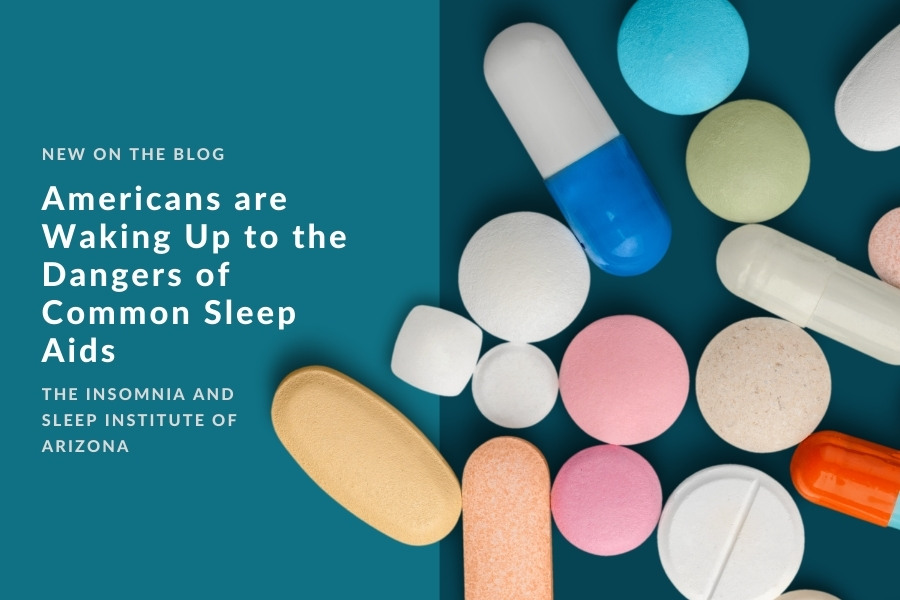What can you do if you struggle to go to sleep or stay asleep? For years, many people would reach for sleeping pills, whether prescription or over-the-counter. However, this is not a reasonable (or oftentimes safe) solution long-term. The Insomnia and Sleep Institute of Arizona treats all types of sleep disorders, but insomnia is one of the most common. Both acute and chronic insomnia can interfere with your daily life—but so can routine use of sleeping pills. We have good news: insomnia is treatable without medication in most cases, and there has been a steady decrease in the use of sleeping pills.
According to the National Health and Nutrition Examination Survey, there was a 31 percent drop in the use of sleeping pills prior to the onset of the pandemic. Most of those who stopped use were 80+ years old. This decline occurred between 2013 – 2018, and researchers reached this estimate after surveying nearly 30,000 people. The medications they asked about were separated into two categories: those that were FDA-approved and those used as off-label.
What Caused the Decline?
According to the researchers, the major driving force was an overall decline in FDA-approved medications to treat insomnia (particularly for chronic sufferers). However, increased knowledge on the dangers of medication dependency was also likely a factor. A reduction in sleep medications was seen on a national level, with experts agreeing that recent commitments to educating the public about dependency dangers is working. According to one of the lead authors, he was both “surprised and encouraged by the results.”
There is a myriad of reasons as to why sleep aid medications usually aren’t the best solution for insomnia. However, in older adults, these medications are even riskier. Sleep medications have been linked to an increase in falls, injuries, and death. Instead, one of the most effective and pharmaceutical-free means of managing insomnia is cognitive behavior therapy for insomnia (CBT-I). That’s why we have a clinical psychologist focused on CBT-I on staff in our clinic. Changes to sleep hygiene practices can also be a very helpful tool.
The Pandemic’s Effect on Sleep Aid Use
Although it is still a bit too soon to tell, early reports regarding sleep aid use at the onset of the COVID-19 pandemic suggests that the pandemic caused a resurgence in use. Stress is one of the most common triggers for insomnia, and there has been plenty of stress in the past two years. Some sleep medications can be addictive, so reaching for sleep medication during one of the most challenging times in many people’s lives is not surprising.
Just because insomnia is a common sleep condition doesn’t mean that it should be accepted. Help is available. Working with leading sleep experts can help you achieve the sleep you need and deserve. Insomnia is most common in adults, but children can also suffer from this condition. In the vast majority of cases, there are treatment options that do not involve medications, but the earlier you act the more you reduce the odds of reaching for medications.
Help with Your Insomnia
Just one night of poor sleep (such as staying up late for an event or jet lag) can seriously disrupt your routine. Fatigue can affect your driving just as much as alcohol. Acute and chronic insomnia can both negatively impact your professional and personal life. Some people opt for melatonin for what they believe to be a more “natural” means of getting help with their sleep. However, some studies have shown that melatonin, when not organically sourced, can interfere with your body’s natural ability to produce this hormone. That’s why it is especially critical to avoid chronic use of this product in children.
If you or your child has issues with insomnia, book a consultation today for help. No MD referral is needed for a consultation at the leading Arizona sleep clinic, where you will meet with a sleep expert who can diagnose conditions during your first meeting. Connect today and get started on the fast track to better, more restful sleep. Call The Insomnia and Sleep Institute today to schedule your appointment, or for a faster response, complete the online form now.





